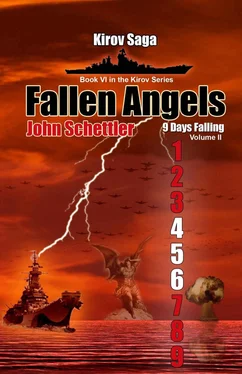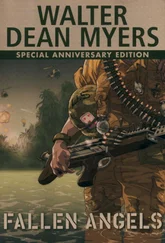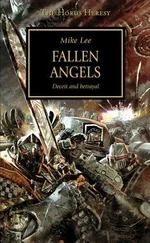“Aye, sir, signaling now.”
“Medium range SAM system, Samsonov; salvos of eight. Track and fire when ready.”
“Sir! Firing now.” Victor Samsonov was only too eager to get into the fight. The aft deck of Kirov sounded off the loud warning claxon, and the hatches opened. The missiles were up soon after, jetting away on fiery tails with ash-white smoke in their wake.
Four…Eight…Twelve…Sixteen…the weapon was called the Klinok shipboard multi-channel self-defense system, NATO designation SA-N-92 Gauntlet , and the pilots of the oncoming strike wave would soon be running the gauntlet of fire and steel. The short reaction time and high rate of fire for the missiles made it ideal in this role, and the missiles Kirov fired had much improved range over the initial system developed two decades earlier. It was a tried and true multi-channel tracking system with the ability to use laser, TV, or radar to find targets. Each radar could simultaneously prosecute eight targets, and reassign remaining live missiles in the salvo to new missions if their original target was destroyed.
Karpov turned to Rodenko, who was keeping one eye on the Plexiglas situation plot adjacent to the radar systems. “How far away is the main body?”
“About 250 kilometers southwest of our position, sir. Speed thirty knots, heading due north at 360 degrees.”
“Fools rush in. Very well, let’s send them a message that should give them something to think about. How soon before we have them in SSM range?”
“You’re moving to a surface action, sir?”
“A preemptive action, Rodenko. If we give them a hard shove on the shoulder now, it could spare us a much more involved battle later. If I can get them to back off here, all the better. At the moment they may be under the illusion that we are nothing more than a small surface flotilla—Soviet ships, or even Japanese. I want them to know we can hit them at range, strike them like an aircraft carrier. It should give them something to think about, and perhaps it will take the starch out of their collars down there and we can talk sense.”
Rodenko nodded his agreement, though he still wondered what the Captain had in mind for that conversation. What was he thinking to say to the Americans now? Yet this was not the time or place for that discussion, so he considered their surface action missile loads. They had left Vladivostok with a standard load of ten P-900 Sizzlers , ten MOS-III Starfires , and twenty Moskit-IIs . Four P-900s were expended earlier against American patrols in the Kuriles.
“Sir, we can fire the P-900s now, but we have only six remaining for that system. The Moskit-II system should be in range momentarily. At our present speed due south, the range is diminishing by about 100 kilometers per hour. We can fire in about fifteen minutes.”
“Very well. Mister, Samsonov. Ready a half salvo on the P-900 system—four missiles please. Target the core of the enemy fleet. Set ship target profile preference to aircraft carrier. On my command fire at thirty second intervals.”
“Ready on P-900 system, sir.” The deadly missiles could be programmed to seek out a specific target profile, analyzing a ship’s silhouette to determine the target type. They could also fly evasive low level approach runs to avoid screening targets to get to their primary, an evolution that made them particularly effective.
“Are these missiles reprogrammed for plunging fire?”
“I’m sorry sir, they are all in standard configuration. We have had no time to reprogram the overall attack profile.”
“Nor did we have any reason to in 2021,” said Karpov. “No matter, the sea skimming approach should do. There are four aircraft carriers down there, and my guess is that they will have more planes than we have seen thus far. I want to make their lives a little more difficult and discourage any further launches. Sorry if we have to spoil their lunch.”
Karpov was jaunty, pacing back and forth in front of the citadel view screens, the ocean beyond clear and calm. The sound of the SAM defense batteries was loud in the air, and their white tails scored the sky as they sped away, but as yet not one of the distant American planes they were seeking had come within visual range. It was Beyond Visual Range naval combat, and they could not see the carnage they were inflicting some thirty kilometers away now, only the green blips on the radar turning red when a missile hit its target.
Yet Rodenko was at least encouraged by the fact that Karpov was fighting the engagement in a measured way. He could have sent a withering saturation barrage at the American ships, and inflicted tremendous damage. By using only four missiles he would give them a stiff, painful jab in the face, and still preserve the ship’s vital missile inventory.
Even as he thought that, Rodenko realized those missiles would more than likely run out again, and perhaps sooner than they thought. And without our missiles, he thought, we are nothing more than a fast cruiser, and not a particularly well armored one either. Karpov was taking things slowly here, and at least they were not alone this time. They still had Orlan and Admiral Golovko , but what else did the Americans have down there, and were they prepared to use it? Would they negotiate with Karpov after an engagement like this; after losing planes and men, or even a carrier when Samsonov lets loose that salvo?
* * *
Orlan was particularly effective with its lethal missiles traveling so fast at Mach 15 that the pilots had no time to even react once they caught sight of the approaching contrails. It was hideous, and in Higman’s flight they were two planes light already, with Nuall and Hallard both dead and gone into the sea. But Higgy Higman was still there in Round Trip Ticket, bravely pressing his Helldiver forward. He thought he saw something on the distant horizon now—yes, there was a ship, then another, and those damn rocket trails pointed out the way.
“Ships at eleven-o-clock!” he shouted. “Pickett? You still up front?”
“Yeah, I see ‘em. Going in now!” Pickett was there, bravely leading the charge, and it was already one for the record books. Of the 54 planes off Ticonderoga , only 22 remained. There were seven Helldivers , five Avengers and the rest were fighters. The squadrons off Wasp had also been ravaged by the deadly precision rockets that had claimed one plane after another in a hellish nightmare in the skies. But the American pressed on.
Higman grimaced and shirked when he saw Stevens plane hit above him. It was a near miss, but a small fragment of shrapnel struck his windshield on the right side and he could see the glass spider out in a crack. He pulled the stick and threw his helldiver over to get ready to dive. Then he heard something he had never once heard before in battle. It sounded like Iron Mike Mulligan was throwing in the towel!
“All units; all flights, this is Mulligan. We have orders to abort. I repeat, break off and do a 360. They want us out of here on the double.”
Hot damn, thought Higman. I’ve got the bastards right in front of me and lost two good men getting here, and now they want us to bug out and fly home? What kind of stew was Mulligan serving up today? The same thing had happened over Tokyo a few days ago. Maybe the brass had negotiated a settlement to this conflict, but it sure didn’t look like it from his point of view.
“What’s up, Big Mike? Why we turning tail?”
“Orders from Flag! Pull on it and get out of there, before one of those rockets lights your ass on fire!”
Higman shook his head, distressed, angry, but knowing he couldn’t take the fight to the enemy alone. It would be all he could do to get what was left of his squadron back to Ticonderoga , and there would be a lot of empty chairs at the flight debriefing this afternoon. Hell! They must have lost thirty planes in ten minutes. He had never seen anything like it. At the “Great Marianas Turkey Shoot” they had taken down over 500 Japanese planes while losing only 23 on the first day. By that stage in the war the fine edge of pilot training, tactics, and the new planes the US deployed was enough to make for a decisive and overwhelming victory in the most lopsided aerial duel in history. It had been a long time since the US took a licking in the skies over the Pacific.
Читать дальше











